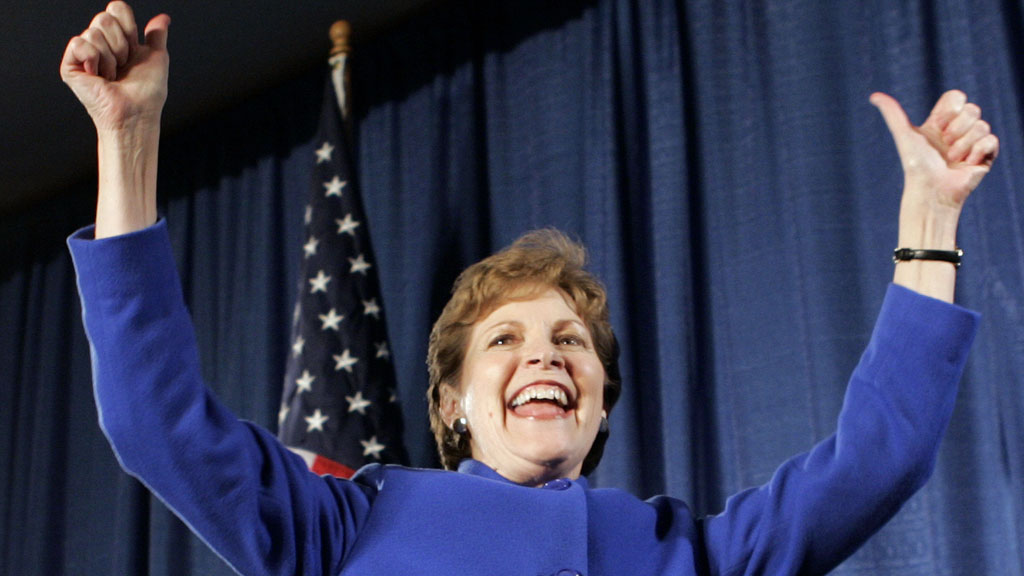Woman power smashes glass ceiling in New Hampshire
New Hampshire made history today: becoming the first state where women now hold all its top leadership positions. So is the Granite State unique – or a model for others to follow?

“Pink is the new power colour in New Hampshire”, delcared Ann McLane Kuster, one of the new slate of women who have taken the state’s leadership by storm. Joining her are governor Maggie Hassan, senators Jeanne Shaheen and Kelly Ayotte, and fellow US representative Carol Shea-Porter.
All this, in a state which also has a female speaker of the state Senate and House, and a female chief justice. New Hampshire’s glass ceiling has been well and truly shattered.
“It’s just exciting to know that we’re in a place where I think about my daughter – that anything she wants to do, puts her mind to, she can do”, declared Senator Ayotte.
So what is it about the state which has helped women to achieve such high profile positions? Channel 4 News spoke to Elizabeth Ossoff, director of research at the New Hampshire Institute of Politics at St Anselm College.
Despite its small size, New Hampshire boasts a 400-strong legislature – the third largest in the world, behind the British parliament and the US Senate. Members don’t get paid, beyond a token stipend of $100 a year.
Because of this, says Ossoff, people in New Hampshire are used to electing a diverse group of people. And because the legislature isn’t in session all year, and has such a large number of seats, there is more opportunity to get involved.
“Women who run businesses, stay-at-home moms, retired people, the very young: New Hampshire is comfortable with that kind of diversity”, she said. Unpaid political positions – practically seen as volunteering – have also proved more open to women who don’t need to be the family breadwinners.
In 2008 the state legislature became the first in the US to have more than 50 per cent women. Jeanne Shaheen is the first woman in American history to have served first as governor, then in the US Senate.
Pink is the new power colour in New Hampshire. Rep Ann McLane Kuster
Maggie Hassan first got involved in politics as an advocate for her son Ben, who has cerebal palsy. She met Jeanne Shaheen, then governor, who asked her to serve on a school funding board: from there it was a short journey into state office.
“There are lots of opportunities for women to pitch in, prove their competence, and learn a lot about governing and the political process”, she told the New York Times. Experience might be important, but what counts is the confidence to get involved in the first place.
New Hampshire, the “First in the Nation” state, which has traditionally held the first primary vote in the long presidential election race, is a place where grassroots politics most definitely sets the rules.
Getting involved
Voters there are well used to turning up to meetings, debating with candidates, discussing the key issues of the day. And because it is such a small state, the emphasis is more on going door-to-door, and making personal contacts – the essence of what’s known as retail politics – rather than advertising campaigns funded by big money.
Women who have made it to leadership positions feel it is their duty to mentor others who are just beginning their political careers: some even helping with childcare for younger colleagues so they can attend meetings or hold events.
There is less of an old-boy network, and more in the way of mutual support, with several organisations set up by Republicans, Democrats and local bodies to encourage women into the political process.
Having so many successful role models is cruicial: women typically think they would not be able to juggle a family with the demands of political office, but figures like Shaheen, or Hillary Clinton on the national stage, have proved an inspiration.
The world won’t fall apart if (women) are in charge: indeed, quite the opposite. Elizabeth Ossoff, New Hampshire Institute of Politics
Marie Wilson, founder of the White House project, told Buzzfeed: “We forget that when people see a woman like Hillary who has triumphed and who is being talked about as the candidate for 2016, they feel more respected. So it’s very powerful for women across the country to see that story.”
So could New Hampshire itself become a role model for other states – like the four which have never elected a single woman to national office? Elizabeth Ossoff says it could become an example, of sorts.
“They are a model in the sense that they have demonstrated that it is possible to have women leaders, and successful”, she said. “Women have to get their feet in the door, show everybody that the world won’t fall apart if they are in charge: indeed, quite the opposite.”
Today’s women politicians are no longer running on mens’ coat-tails: no longer simply the widows, wives or daughters of politicians, but figures in their own right. If New Hampshire proves anything, it is that a little experience, a lot of support, and an ease with diversity, can transform a political system into one where gender is simply not an issue.
How very 2013.
Felicity Spector writes about US politics for Channel 4 News
-
Latest news
-
Year of civil war in Sudan ‘a nightmare of hunger and displacement’4m

-
Israel fears repeat Iran attack, says former editor of Jerusalem Post4m

-
How long could it take to clear the Rwanda asylum seeker backlog?3m

-
Rwanda asylum boost for Sunak as bill expected to become law2m

-
Donald Trump trial: day one of historic Stormy Daniels court case4m

-




